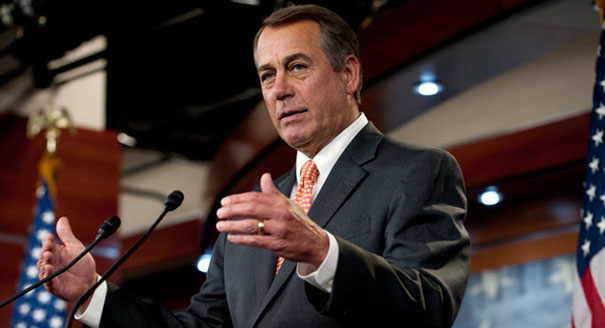House Speaker John Boehner won’t take no for an answer. As the House struggles to consider and vote on nearly 600 amendments to the FY2011 budget – in a process the GOP is heralding as unprecedented democracy and the Democrats are calling chaos – the prospects for consensus on the continuing resolution is becoming increasingly narrow.
After all, House members were supposed to leave Washington for their districts at the end of the day today. Next week is President’s Day recess. By the time they get back, there’s just a week until the current budget extension expires – not enough time to send it to the Senate, get a filibuster-proof vote there, send it to conference to reconcile the two versions, send it to the president, and get it signed in time to prevent a government shutdown.
There is an easy out – the House could just give itself a little more time, passing another interim extension, keeping federal spending at current levels for another week or month. But Boehner has said he won’t allow it. That means this “open” debate process creates an ultimatum for the Senate – accept the House budget as-is, or the government will shut down, with no budget authority to spend a dime.
And Democratic Senate leaders have indicated that they have no appetite for the starvation-diet bill moving through the House. Neither, it turns out, do some moderate GOP House members. Politico reports that they’re beginning to defect, voting against cuts to things like legal aid to the poor, community policing, and first responders.
Meanwhile, despite his take-no-prisoners attitude on spending cuts, Speaker Boehner tried to save a budget line-item for an F-35 fighter engine that the administration and many lawmakers have been trying to get rid of for years. The issue? The engine is built in Boehner’s home state of Ohio. He didn’t get his way, however – Democrats and Tea Party Republicans joined forces to cut funding for the engine.
The continuing budget resolution includes deep cuts to transportation and housing. But while the House held a vigorous, and exhausting, debate on these cuts, the Transportation and Infrastructure Committee quietly approved another extension of SAFETEA-LU, continuing the 2005 bill through the end of FY2011, regardless of what Congress decides to cut in the budget negotiations.
While the House struggles to put the 2011 budget to bed – nearly five months into the 2011 fiscal year – the president’s budget request for 2012 awaits consideration, promising even more controversy.






